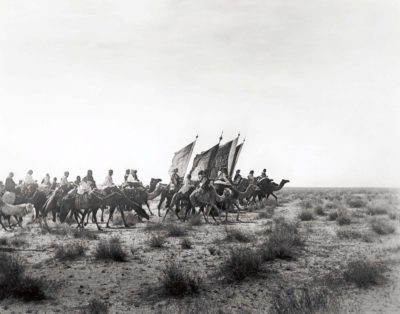King Ibn Saud on the people of Najd ca. 1928
From Rehan Ud Din Baber’s page, quoting King Abdul Aziz ibn Saud in the book ‘Ibn Sa?oud of Arabia, his people and his land’ by Ameen Rihani:
“The Arabs of the North,’ he said, ‘ are heavy of foot and stolid; the people of Najd are quick, light, wiry. They snap and break not. Like our camels. The zelul of the North is strong but slow; that of the south is fast, although he has not so much enduring power. But the people of Najd are like the Bedu in hardship and adversity.
We train ourselves in endurance. We put up with much that is hard and onerous. It is our land, our habit of life, our destiny —all one. We have to be always ready and fit. I train my own children to walk barefoot, to rise two hours before the dawn, to eat but little, to ride horses bareback, —sometimes we have not a moment to saddle a horse—leap to his back and go! This is the Najdi —the Najd spirit—the Najd condition of life. Especially the Najdis of the South — we are like our Bedu in this.
‘The people of Al-Qasim are traders and are not, therefore, so hardy and brave as the people of Al-‘Ared or the Bedu of the Kharj country. There in the south are the hardest and most truculent of the Bedu; the Benu Murrah and the Dawasir are savages. In their quarrels, they thrust their jambiyahs (daggers) into each other, an’d draw them out exultantly ‘—the Sultan illustrated the following by drawing his finger across his teeth—’ and lick the blood. They are madmen in the fight. Bravery is something common among the lowest of them. In the days of peace they come to us for every thing—food, clothes, money. But in times of war the poorest and meanest among them makes not a demand.
It is a shame with the people of Najd to ask for anything when we are at war or on a gazu. They gather up their own, pull down the bundoq, saddle the zelul,’—here he snapped his fingers. ‘Our little serves much during war. We used to go four or five days without food —just a date to suck at for a little nourishment and moisture.'”
